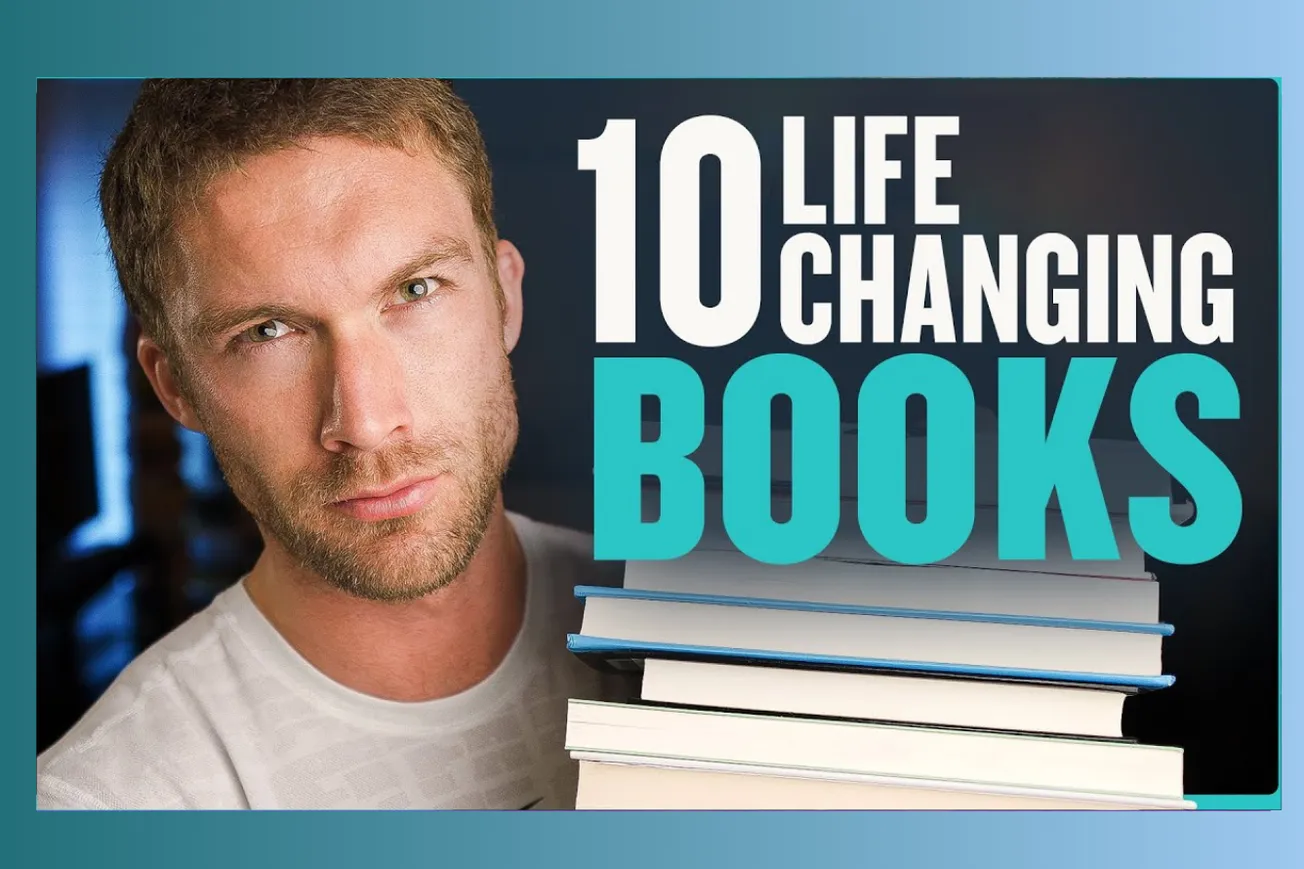Table of Contents
A curated selection of transformative reads spanning personal development, evolutionary psychology, existential risk, and human resilience that offer practical wisdom for navigating modern life's complexities.
Key Takeaways
- Essentialism teaches you to focus on the vital few rather than the trivial many in an age of overwhelming choices
- Real-life survival stories provide perspective on what constitutes genuine hardship versus modern inconveniences
- Understanding evolutionary psychology reveals the hidden drivers behind human behavior and relationship patterns
- Existential risk awareness transforms your sense of responsibility toward future generations and global stewardship
- Depression often stems from unmet environmental needs rather than chemical imbalances, putting control back in your hands
- Professional mindset shifts from amateur to pro can revolutionize your approach to creative work and personal projects
- Sleep optimization may be the single most impactful change you can make for health and performance
- Honest communication eliminates anxiety and builds authentic relationships through truth-telling as a superpower
- Human endurance capabilities far exceed what most people believe possible when facing genuine challenges
- Ethical dating advice focuses on becoming genuinely attractive rather than manipulative techniques
Timeline Overview
- 00:00-15:00 — Essentialism life design principles, Forgotten Highlander WWII survival story, truth-telling transformation through Sam Harris
- 15:00-30:00 — Evolutionary psychology insights, existential risk awareness, depression environmental factors, creative professional mindset
- 30:00-45:00 — Antarctic survival story inspiration, sleep optimization importance, ethical dating advice principles, overall reading recommendations
Essentialism: The Disciplined Pursuit of Less
Greg McKeown's "Essentialism" addresses perhaps the most pressing challenge of modern life: choice overload in an age of infinite possibilities. "If you feel like you're always busy but not getting anywhere, if you struggle to make progress towards your meaningful long-term goals, this is for you," the speaker explains.
The book's core principle involves focusing on "the vital few and not the trivial many" - a philosophy that provides clarity in our information-saturated, opportunity-rich environment. For someone who "always loved saying yes" to more businesses, trips, and adventures without understanding how they contributed to actual goals, essentialism provided crucial life design framework.
The methodology forces systematic evaluation: "essentialism forces you to strip away everything which is non-essential and gets you back on track focusing on the only things that genuinely matter." This isn't about productivity hacks or time management tricks, but fundamental reorientation toward what deserves attention in the first place.
Modern life presents unprecedented choice paralysis. We're "overloaded with information and choices and business opportunities and Adventures and it's very difficult to work out what we actually should be doing." Essentialism provides decision-making criteria that cut through this noise.
- The book offers practical frameworks for distinguishing between what feels urgent versus what's actually important for long-term fulfillment
- Learning to say "no" strategically becomes a superpower for protecting time and energy for meaningful pursuits
- The methodology helps identify activities that provide genuine progress toward goals rather than just creating busyness
- Essentialism works as foundational reading before other personal development books because it establishes clear priorities first
- The approach particularly benefits people who struggle with people-pleasing or have difficulty setting boundaries around their time
- Implementation requires honest assessment of current commitments and willingness to eliminate good opportunities to focus on great ones
Starting with essentialism before reading other personal development material ensures you're optimizing for outcomes that actually matter to you.
The Forgotten Highlander: Perspective Through Extreme Survival
Alistair Urquhart's "The Forgotten Highlander" provides perspective on human resilience through one of the most extreme survival stories ever documented. A Scottish soldier captured by Japanese forces in Singapore endures three and a half years of brutal conditions where "almost every one of his friends die."
The survival challenges seem almost impossible: forced labor building the bridge over the River Kwai, being left to die in a "Hell ship with cannibals on board which then gets torpedoed by a US submarine," capture again, and working "a mere 10 miles from the Nagasaki Bomb Blast" - yet he survives it all.
What makes the story particularly powerful is Urquhart's response afterward: "he kept quiet for over 50 years and finally wrote this Memoir as a call to Arms to bring the Japanese to account for what they got up to during the war." The delayed telling adds weight to the testimony.
The book serves as a psychological reset tool for modern frustrations. "When I'm stuck in traffic or annoyed that my internet's running slow or pissed that the deliveroo driver's gone next door it makes me reset and actually focus on just does it matter." The contrast between genuine hardship and contemporary inconveniences provides essential perspective.
- Reading extreme survival stories recalibrates your stress response to focus on actual rather than perceived threats
- Historical accounts of human endurance expand your conception of what's possible when facing genuine challenges
- The book serves as antidote to first-world problem thinking that dominates much of modern anxiety
- Understanding real hardship helps distinguish between legitimate concerns and trivial irritations that consume mental energy
- Urquhart's story demonstrates how individuals can maintain dignity and purpose even under dehumanizing conditions
- The delayed memoir writing process shows how processing trauma can take decades but still serve important historical purposes
This type of reading provides psychological inoculation against the tendency to catastrophize minor modern inconveniences.
Lying: The Transformative Power of Radical Honesty
Sam Harris's "Lying" presents a compelling case for eliminating dishonesty from your life in a concise, one-hour read. While the speaker wasn't "lying all the time," they recognized that "telling the truth is actually quite difficult especially if you're not working on it" because it's often "easier to tell a lie than to tell the truth."
The book provides systematic analysis of lying's mechanics and consequences: "Sam's book is a really good insight into the nature of lying why you do it and the negative effects that it has on you and others." This isn't moralizing but practical psychology about how dishonesty affects relationships and self-concept.
Truth-telling becomes "like a superpower" with measurable benefits: "you never have to remember what you said you never have to be concerned about being found out for something because what you did always aligns with what you said you did." The cognitive load reduction alone justifies the practice.
The psychological benefits extend beyond mere convenience: "it really does alleviate a lot of anxiety and it makes you more proud of the person that you are especially if you've gone through your 20s perhaps doing some stuff that were less than honorable at times." Honesty rebuilds self-respect and reduces shame.
- Radical honesty eliminates the mental overhead of tracking multiple versions of events and maintaining consistent stories
- Truth-telling reduces anxiety because you never worry about being "found out" since your words match your actions
- The practice builds genuine self-confidence based on authentic behavior rather than constructed personas
- Small lies create psychological distance between your actual self and presented self, undermining self-respect over time
- Implementing honesty requires developing skills for difficult conversations and boundary-setting rather than conflict avoidance through deception
- The book's brevity makes it accessible while providing sufficient philosophical foundation for major behavioral change
Starting this practice early prevents the accumulation of small dishonesties that compound into major relationship and self-esteem problems.
The Ape That Understood the Universe: Decoding Human Nature
Steve Stewart-Williams's exploration of evolutionary psychology provides "the closest you're going to get at peering under the hood of your own behavior and discovering why you do the things you do." The book makes complex scientific concepts accessible while addressing fundamental questions about human nature.
The scope covers essential human universals: "why are we attracted to certain traits in the opposite sex or why is jealousy a thing are we monogamous creatures why do we help our family more than we help strangers or why do we make alliances with some people and enemies of others." These aren't abstract academic questions but practical insights into daily behavior.
For someone who doesn't "like being at the mercy of my programming," understanding evolutionary impulses provides crucial self-awareness: "becoming aware of the evolutionary impulses that are driving my behavior was super insightful and very satisfying." Knowledge creates space between impulse and action.
The book delivers consistent revelations: "it's basically just an endless barrage of jaw-dropping discoveries and it's really easy to read I found myself highlighting pretty much every other paragraph." The combination of scientific rigor and accessible presentation makes complex topics engaging.
- Understanding evolutionary psychology helps explain seemingly irrational behaviors by revealing their historical adaptive functions
- Awareness of biological impulses allows conscious choice about which behaviors to express versus suppress in modern contexts
- The book explains relationship dynamics, social hierarchies, and conflict patterns through scientific rather than moralizing frameworks
- Learning about human universals reduces personal anxiety by showing that many psychological experiences are normal rather than pathological
- Evolutionary insights inform better decision-making about everything from career choices to romantic partnerships
- The scientific approach provides objective framework for understanding human behavior without falling into cultural bias or personal assumptions
This knowledge base helps navigate social situations with greater understanding and intentionality rather than just reacting to unconscious programming.
The Precipice: Humanity's Greatest Challenges
Toby Ord's "The Precipice" addresses existential risk - "how Humanity could go extinct the relative likelihoods of each risk occurring and proposed Solutions." The comprehensive analysis covers "asteroids to artificial intelligence bioweapons to nuclear war" as a "one-stop shop for understanding the risks that our civilization faces."
The book fundamentally altered the speaker's worldview: "The precipice really did shake my worldview quite fundamentally and reminded me that as a steward of the globe right now do have a duty to all of the future Generations that are going to come to leave this a better world than I found it."
Reading about existential risk creates profound psychological shifts: "it also gave me a sense of awe and Dread kind of like when you look up at the night sky it makes you feel insignificant in a beautiful way and it stretches that out across an entire book." The perspective change resembles astronomical contemplation but applied to temporal rather than spatial scales.
The book's impact extends beyond intellectual understanding to practical behavior change: "it's changed the way that I go about my day pretty much all the time." Understanding global challenges provides context for daily decisions and long-term planning.
- Existential risk awareness transforms your sense of responsibility toward future generations and global outcomes
- The book provides "biggest picture" perspective that contextualizes personal problems within civilizational timeframes
- Understanding potential extinction scenarios motivates engagement with important causes rather than trivial pursuits
- The comprehensive analysis helps prioritize which global risks deserve most attention and resources
- Reading about humanity's future creates sense of cosmic significance that can motivate meaningful work and contribution
- The accessible presentation makes complex topics understandable without requiring technical background in risk analysis
This type of reading expands temporal perspective beyond personal lifetime to consider humanity's long-term trajectory and your role in influencing it.
Lost Connections: Reframing Depression Through Environment
Johan Hari's "Lost Connections" challenges conventional understanding of depression by emphasizing environmental factors over chemical imbalances. "For a long time Depression was judged as an imbalance of chemicals in the brain and that the environmental impact was actually very small Johan turns this on its head."
The reframing proves empowering: "unmet needs not unrequired chemicals are what might be causing depression it puts you back in control and this was what I found very liberating about it." Rather than viewing depression as purely medical condition, the book suggests environmental interventions.
The approach emphasizes personal agency: "it permitted me to do what I always knew was right that I have control over my mood on a day-to-day basis and that there are certain Pathways that I need to make sure I'm fulfilling before I can say I have a problem with my brain."
The book provides practical checklist for mental health: "are you getting up at the right time each day are you eating sleeping walking do you have friends that care about you do you have a job that you committed to do you have a local community that you feel a part of." Environmental optimization comes before medical intervention.
- Depression often results from social disconnection, lack of meaning, and unmet psychological needs rather than brain chemistry alone
- The environmental approach empowers individuals to address root causes through lifestyle changes rather than feeling helpless about chemical imbalances
- Hari's research spans global examples showing how different cultures address mental health through community and purpose rather than medication
- The framework helps distinguish between clinical depression requiring medical treatment and depression resulting from unmet social/psychological needs
- Understanding environmental factors reduces stigma by showing depression as rational response to difficult circumstances rather than personal failure
- The book emphasizes community connection, meaningful work, and nature contact as essential for mental health rather than optional lifestyle choices
This perspective helps people take constructive action on mental health rather than waiting for external medical solutions to internal emotional problems.
The War of Art: From Amateur to Professional Mindset
Steven Pressfield's "The War of Art" addresses creative challenges through the lens of professionalism versus amateurism. While many read it for procrastination help, the speaker "fell in love with one chapter right in the middle called turning pro" which transforms approach to creative work.
The professional mindset involves treating pursuits seriously: "we need to treat the pursuit that we are going after in our lives seriously that we need to treat it like a professional and not an amateur that we need to lean in to the discomfort that we have because that's what a professional does."
This realization changed the speaker's entire approach: "it made me change the entire process that I had and my approach to the podcast and this YouTube channel because I thought well I want to be really really good at this so what would a professional do."
The book's impact was so significant that "Steven went on to write an entire second book called turning pro about the exact same topic" because so many readers resonated with this particular chapter.
- Professional mindset means showing up consistently regardless of motivation levels or external circumstances
- Professionals understand that discomfort and resistance are normal parts of the creative process rather than signals to stop
- The amateur waits for inspiration while the professional creates conditions for inspiration through disciplined practice
- Treating your craft professionally involves investment in proper tools, education, and systematic skill development
- Professional approach requires accepting that most work won't be your best work, but consistency creates opportunities for excellence
- The mindset shift from hobby to profession changes how you handle criticism, setbacks, and long-term development
Adopting professional mindset accelerates skill development by creating sustainable systems rather than relying on sporadic bursts of motivation.
Endurance: Human Potential Under Extreme Conditions
Alfred Lansing's retelling of Ernest Shackleton's Antarctic expedition provides powerful illustration of human resilience and leadership under impossible circumstances. "In 1914 Shackleton and his team they tried to cross the Antarctic and pretty much everything that could go wrong does go wrong."
The survival story spans over two years of being "stranded and having to survive... in the harshest conditions on the planet" with the "entire narrative in brutal detail" creating "powerful and inspiring story" about the outer limits of human endurance.
The book expands conception of personal capability: "it reminded me just how far human potential can go that when I'm facing discomfort where I think my limit is is probably not even halfway there is so much Headroom above that." Modern comfort obscures our actual capacity for handling difficulty.
The historical context adds authenticity: "hearing this story from an analog age you know 1914 they left just after the first world war was declared" shows what humans accomplished without modern technology or safety nets.
- Historical survival stories demonstrate human capacity for enduring hardship that far exceeds most contemporary challenges
- Reading about extreme endurance expands your mental model of what's possible when facing genuine adversity rather than perceived obstacles
- Shackleton's leadership principles provide practical insights for managing teams and maintaining morale under pressure
- The story illustrates how maintaining hope and purpose can sustain people through seemingly impossible circumstances
- Understanding pre-modern survival capabilities puts contemporary comfort and convenience into historical perspective
- The narrative demonstrates how extraordinary circumstances can reveal character traits and capabilities that normal life never develops
This type of reading serves as psychological preparation for handling genuine challenges by expanding your conception of human resilience.
Why We Sleep: The Foundation of Health and Performance
Matthew Walker's comprehensive analysis of sleep divides people into "two camps the first one are people who do understand the impact of sleep on your health and your performance and the second one are the people that don't." For someone working as a club promoter until "3 or 4:00 a.m. multiple nights per week," sleep was just "the annoying thing that I did in between finishing work and then getting up to go back to work again."
The book fundamentally changed this perspective: "this book is single-handedly responsible for redpilling me on how much my health and my performance was suffering because I wasn't prioritizing sleep." The comprehensive research makes the case for sleep as foundational rather than optional.
Walker provides both theoretical understanding and practical application: "you find out tips for how to improve and optimize your sleep insights into the function of why we do it for the human body." The combination of why and how makes implementation more compelling.
The speaker considers it definitive: "I think this is the only book that you need on sleep in my opinion and if you don't understand the effects on your health and your longevity then dedicate some time to it here." The comprehensive coverage eliminates need for multiple sources.
- Sleep affects virtually every aspect of physical and mental performance including memory consolidation, immune function, and emotional regulation
- Chronic sleep deprivation creates health impacts comparable to smoking or excessive alcohol consumption but receives less attention
- Understanding sleep stages and circadian rhythms helps optimize timing for both sleep and wakefulness activities
- The book provides practical strategies for improving sleep quality through environmental factors, timing, and behavioral changes
- Walker's research demonstrates how modern lifestyle factors systematically undermine natural sleep patterns with serious health consequences
- Prioritizing sleep often requires cultural mindset shift from viewing it as laziness to recognizing it as essential for optimal performance
Implementing sleep optimization may provide more performance improvement than any other single lifestyle change.
Models: Ethical Attraction and Authentic Dating
Mark Manson's "Models" addresses dating advice from ethical rather than manipulative perspective. "Manson went on to super stardom after this but the book is still a classic it breaks down the root behaviors that cause female attraction and it gives actionable and ethical advice."
The book distinguished itself from problematic pickup artist material: "previously a lot of the dating advice I'd got especially for men was a bit icky it felt quite predatory in a way and it was all about oh you've got to neg the beater and then twist the lemon." This approach felt inauthentic and manipulative.
Manson's approach focuses on fundamental development: "I wanted to just understand the fundamental principles and then allow my personality to come through." The goal involves becoming genuinely attractive rather than learning manipulation techniques.
The philosophy emphasizes authentic development: "the purpose isn't to turn you into some different sort of a person can sleep with a girl and then that doesn't know what to say to her the next day it's to become the sort of man that is attractive to women." Long-term relationship success requires genuine rather than performed attractiveness.
- Ethical dating advice focuses on developing attractive qualities rather than manipulation techniques or surface-level strategies
- Understanding fundamental principles of attraction allows personality expression rather than requiring artificial persona adoption
- The book emphasizes building genuine confidence and social skills that benefit all relationships, not just romantic ones
- Manson's approach addresses root causes of dating difficulties rather than providing quick fixes that don't address underlying issues
- The ethical framework prevents developing predatory attitudes or behaviors that damage both partners in relationships
- Long-term relationship success requires authentic attractiveness that can be sustained rather than performed temporarily
This approach builds sustainable relationship skills while maintaining personal integrity and respect for potential partners.
Conclusion
These ten books span personal development, historical survival stories, scientific insights, and practical skills while sharing common themes of human potential, authentic living, and evidence-based improvement. Together they provide frameworks for navigating modern life's complexities while maintaining perspective on what genuinely matters. The combination of philosophical depth and practical application makes these reads transformative rather than merely informative. Each book addresses different aspects of the human experience while contributing to an integrated worldview that emphasizes truth, resilience, and conscious choice over automatic responses to contemporary challenges.
Practical Implications
- Start with Essentialism to establish clear priorities before pursuing other personal development strategies or optimization techniques
- Use extreme survival stories to calibrate your stress response and distinguish between genuine challenges and modern inconveniences
- Implement radical honesty gradually to build authentic relationships while eliminating the cognitive overhead of maintaining multiple story versions
- Study evolutionary psychology to understand behavioral impulses and create space between unconscious programming and conscious choice
- Develop existential risk awareness to provide cosmic perspective on daily decisions and long-term life planning priorities
- Address depression through environmental factors before assuming chemical intervention is necessary for mental health improvement
- Adopt professional mindset toward creative pursuits by focusing on consistent practice rather than waiting for motivation or inspiration
- Read historical endurance stories to expand your conception of human capability when facing genuine adversity or setbacks
- Prioritize sleep optimization as foundational for health and performance rather than treating it as optional or secondary concern
- Approach dating and relationships through authentic development rather than manipulation techniques or surface-level attraction strategies





